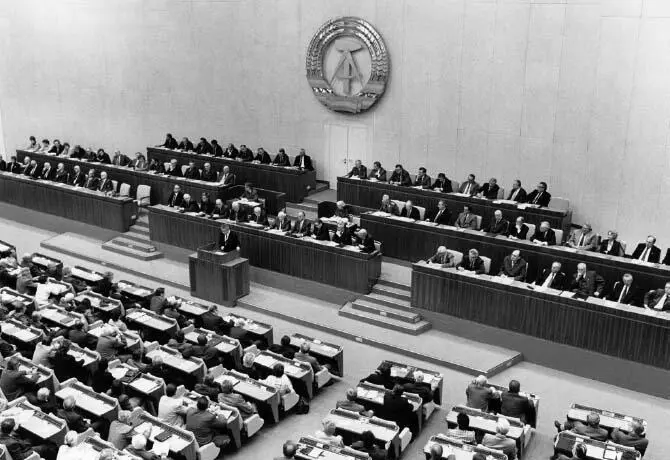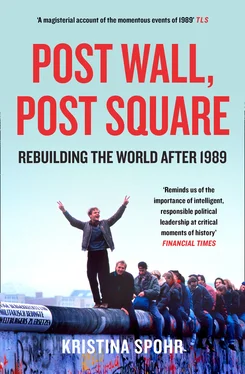Yet the dreaded confrontation never took place. The local party was unwilling to make a move without detailed instructions from the leadership in East Berlin. The army and police were not prepared for the size of the crowd, double what they had expected. Above all, Honecker’s word was no longer law. An intense power struggle was now under way in East Berlin. Egon Krenz – twenty-five years Honecker’s junior – had been plotting a coup for some time. But, despite his recent ‘fraternal’ visit to Beijing, he did not wish to be saddled by Honecker with the opprobrium of a Tiananmen solution at home, because that would stain his own hands with German blood while allowing the elderly leader to blame him for the violence. This left the party paralysed between hardliners, ditherers and reformers. And, with no clear word that night from Berlin, the local party chief did a volte-face. Heeding the Appeal of the Six, he ordered his men to act only in self-defence. Meanwhile, the Kremlin had issued a directive to General Boris Snetkov, commander of the Western Group of Soviet Forces with his HQ in Wünsdorf near Berlin, not to intervene in East German events. The Red Army troops on East German soil were to stay in their garrisons.
So the ‘Chinese card’ was never played. Not because of a deliberate decision by the SED at the top, growing out of a change of heart, but because of the distinct absence of any decision. Time passed. The masses kept marching. There was no violence. The repressive state apparatus that Mielke had pulled together was not confronted with fearsome ‘enemies of the state’ or anarchic ‘rowdies’ but by well-disciplined ordinary citizens bearing candles and speaking the language of non-violence. What they wanted was recognition by the governing party of their legitimate quest for basic freedoms and political reform: their slogan was ‘ Wir sind das Volk ’ (‘We are the people’).[30]
New facts on the ground had been created. And a new demonstration culture had emerged – spilling out from the church vigils into the squares and the streets. The regime’s loss of nerve that night dispelled the omnipresent climate of fear. This would change the face of the GDR. The civil rights activists and the mass of protestors were beginning to merge.
It was a huge victory for the peaceful demonstrators and an epic defeat for the regime. ‘ Die Lage ist so beschissen, wie sie noch nie in der SED war ’ (‘The situation is so shitty, like it never was in the SED’), summed up one Politburo member on 17 October.[31] Next day Honecker resigned – officially on health grounds – and Krenz took over as party boss.[32] But that did not improve the public mood: the people interpreted the power transfer as the result of their pressure from below rather than as the outcome of party machinations and manoeuvrings going on ever since Honecker was taken seriously ill during the Warsaw Pact meeting in Bucharest in July.[33]

Egon Krenz at the Volkskammer as the New Party Secretary of the SED in East Berlin
Krenz promised the Party Central Committee on 18 October that he would initiate a ‘turn’ ( Wende ). He committed himself to open ‘dialogue’ with the opposition on two conditions: first, ‘to continue building up socialism in the GDR … without giving up any of our common achievements’ and second, to preserve East Germany as a ‘sovereign state’. As a result, Krenz’s Wende amounted to little more than a rhetorical tweak of the party’s standard dogma. And, in similar vein, the personnel changes he made among the leadership were largely cosmetic. There was, in short, little genuine ‘renewal’ in the offing: clearly Wende did not mean Umbruch (rupture and radical change).[34]
Not only did Krenz’s accession to power leave more reformist elements in the SED frustrated; worse, he personally appeared clueless in judging the true nature of the public mood. After his election to the post of SED general secretary, he asked the Protestant church leaders when ‘those demonstrations finally would come to end’. After all, continued Krenz obtusely, ‘one can’t spend every day on the streets’.[35] Little did he know.
In any case, Krenz was not a credible leader. Rumours were rife about his health and his alcohol problems. And ‘long-tooth’ Krenz, as he was nicknamed – a party hack for more than thirty years – had no plausibility as a ‘reformer’. So, rather than stabilising SED rule, his takeover actually served to fuel popular displeasure with the party and accelerated the erosion of its monopoly on power. What’s more, when the Krenz regime renounced the open use of force, that token concession only emboldened the masses to demand ever more fundamental change. They now felt they were pushing at an open door: ‘street power’ was shaking ‘the tower’.[36]
After the fall of Honecker on 18 October, anti-government protest – in the form of peace prayers, mass demonstrations and public discussions – spread right across the country. In the process various currents of criticism flowed together into a surging tide. Long-time dissidents from the churches; writers and intellectuals from the alternative left; critics of the SED from within the party; and the mass public spilling out onto the streets: all these fused in what might be called an independent public sphere. They spoke in unison for people’s sovereignty. Discontent was now open. The long spell of silence had been broken.
On 23 October in Leipzig, 300,000 participated in the Monday march around the ring road. In Schwerin on the Baltic, the ‘reliable forces’ who were meant to come out for the regime ended up in large swathes joining the parallel demo by Neues Forum. Next day the protests returned to East Berlin, whose squares had remained quiet since the brutal crackdown of 7 and 8 October. Overall, there were 145 anti-government events in the GDR in the last week of the month, and a further 210 in the first week of November. Not only were these protests growing, the demands were becoming both more diverse and also more pointed:
Die führende Rolle dem Volk (‘The leading role to the people’, 16 October)
Egon, leit Reformen ein, sonst wirst Du der nächste sein! (‘Egon, introduce reforms, or else you’ll be next!’, 23 October)
Visafrei bis Hawaii! (‘Visa-free travel to Hawaii!’, 23 October)
Demokratie statt Machtmonopol der SED (‘Democracy instead of the SED’s monopoly on power’, 30 October)
Conversely, the SED leadership appeared lost for words. Increasingly unable to win the argument, the Krenz Politburo hid behind traditional orthodoxy.[37] In particular, the party was totally unwilling to give up its constitutionally entrenched ‘leading role’ ( Führungsanspruch ) – which was the principal demand of all those who wanted liberalisation and democratisation.[38] To make matters worse, while seeking to reinstate its authority, the regime showed itself bewildered and helpless in the face of the GDR’s deteriorating economic situation. Discussions in the Politburo revolved around how to get consumers more tyres, more children’s anoraks, more furniture, cheaper Walkmen and how to mass-produce PCs and 1 MB chips – not the structural flaws of the economy.[39]
Only on 31 October were the stark realities finally laid bare in an official report to the Politburo by the chief planner, Gerhard Schürer, on the economic state of the GDR. The country’s productivity was 40% lower than that of the Federal Republic. The system of state planning had proved totally unfit for purpose. And the GDR was close to national insolvency. Indebtedness to the West had risen from 2 billion Valutamarks in 1970 to 49 billion in 1989.[fn1] Merely halting further indebtedness would entail a lowering of the East Germans’ living standards by 25–30% in order to service the existing debt. And any default on debt repayments would risk opening the country to an IMF diktat for a market economy under conditions of acute austerity. For the SED, this was ideologically untenable. In May, Krenz had declared that economic policy and social policy were an entwined unit, and had to be continued as such because this was the essence of socialism in the GDR. So the regime was trapped in a vicious circle: socialism depended on the Plan, and the survival of the planned economy required external credits on a scale that now made East Germany totally dependent on the capitalist West, especially the FRG.[40]
Читать дальше













